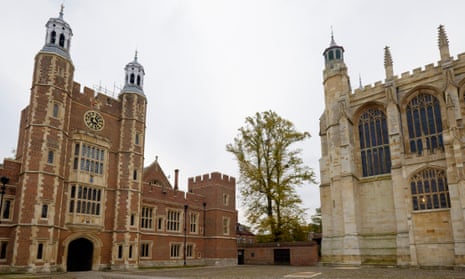Eight top schools in the UK get as many pupils into the universities of Oxford and Cambridge as three-quarters of all schools and colleges together, according to new research.
Over a three-year period the eight leading schools – which are mainly in the independent sector – sent 1,310 of their students to Oxbridge, while 2,900 schools, each with two or fewer acceptances, sent 1,220 pupils in total.
The research showed that high-flying pupils from state schools were far less likely to apply to Oxbridge than their peers in the private sector, and were less likely to be successful when they did apply.
Of the top fifth highest achieving schools almost a quarter (23%) of students in the independent sector applied to Oxbridge, compared with 11% of comprehensive students in the same group. Of those who applied 35% from independent schools were successful and 28% from comprehensives.
Overall, just over one in five (21%) university applications from pupils at private schools are for Oxbridge, compared to 5% at comprehensives and 4% at sixth-form colleges. There are also far higher rates of Oxbridge application at selective schools – 16% of all grammar school applications are to either Oxford or Cambridge.
Researchers, using data gathered by the Universities and Colleges Admissions Service (Ucas), found that students who attended a private school were seven times more likely to win a place at Oxford or Cambridge than those in non-selective state schools.
They were also more than twice as likely to go to a Russell Group university. Six of 10 private school students who were in higher education were at a Russell Group university, compared with just under a quarter of pupils from comprehensives and sixth-form colleges.
The Access to Advantage study by the Sutton Trust, a charity promoting social mobility through education, analysed university applications and acceptance rates for three years starting in 2015, looking at the type of school pupils attended and the regions where they lived.
The results revealed disparities between regions, with about 6% of those applying to university in the south of England winning a place at Oxbridge, compared with 3-4% of those from the north or the Midlands. In some areas, including Rochdale, Rutland, Salford, Lincolnshire and Southampton, two or fewer comprehensive pupils got into Oxbridge over the three-year period.
According to the report, one of the reasons a tiny number of schools continue to dominate Oxbridge admissions is the high level of additional, specialist, support for pupils, which cannot be matched in the state sector.
At Westminster school, which sends 70 to 80 students to Oxbridge each year, pupils are given personalised mentoring and university preparation classes.
At Eton, which sends 60 to 100 students to Oxbridge each year, a dedicated universities officer is “available at any time during the A-level years for interviews with boys or parents”. St Paul’s boys’ school employs 11 specialist UK university advisers – in 2016, 53 of the school’s 189 students who went to university got into either Oxford or Cambridge.
The Sutton Trust is calling for universities to make greater use of contextual data in their admissions process, including reduced grade offers, to recognise the different circumstances of applicants. It also says all pupils should receive professional careers advice to help them make the best informed choices
Chris Millward, director for fair access and participation at the universities regulator, the Office for Students, said the Sutton Trust research highlighted a “‘clear and unacceptable gap in equality of opportunity” for young people from different school backgrounds and regions.
Matt Waddup, head of policy and campaigns at the University and College Union, said: “This report demonstrates that many talented youngsters will never get into some universities simply because nobody is pushing them to consider applying to them. Universities need to help students from backgrounds and schools that don’t traditionally apply to some universities by looking at contextual data.”
